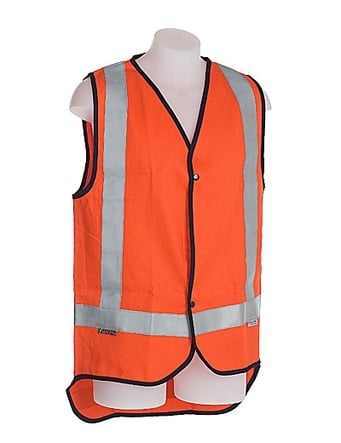


Product code: HVTTMCFR
Arc rated and Fire Retardant Hi-Vis Orange Vest

.png)
PROUDLY MADE IN NZ BY JAEDON
AS/NZS 1906.4:2010 - High visibility materials for safety garments
This standard specifies minimum colour and luminance requirements for fluorescent (F) or non-fluorescent (NF) background (compliant) materials and retro-reflective material (reflective tape) as used in the manufacture of garments for high risk applications.
“Class F” (fluorescent background material):
Refers to Fluorescent fabrics which have fluoro pigments. These include all our Safety Vests, Polo’s, Polyester/Cotton Shirts and Rainwear. Our Fluoro Yellow and Fluoro Orange Polycotton Protex Overalls also meet “Class F”. This includes DOPPC, TTPPCLT & CTPPCLW styles.
“Class NF” (Non—fluorescent background material):
All 100% Cotton Overalls, our natural fibres CTPCNLW and FTPCNLW, the Modacrylic FEPVC and FJPVC, and the 100% cotton Shirts are “Class NF” (Non—fluorescent background material). In general, natural fibres are not capable of taking a fluorescent pigment. The main difference is Class F garments have to meet a lot higher minimum luminance level than Class NF garments.
Click Here for the Fact Sheet on NFPA70E
What is Arc Flash Clothing?
A typical work day for many electrical workers involves hazardous tasks and a high risk of electrical shock and injury. From repairing broken wires to working on electrical lines, electrical workers must wear the proper protective equipment and arc flash clothing to stay safe should an arc flash explosion occur.
What is Arc Rated?
The Difference Between Arc Rated (AR) and Flame Resistant (FR) ... The letters “AR” stand for Arc Rated, and made their debut in the recent revision of NFPA 70E; the short explanation of the difference is that ALL AR clothing is flame resistant (FR), but not all FR clothing has been Arc Rated.
What does HRC2 mean?
Garments compliant to HRC (Hazard Risk Category) 2, as defined by NFPA 70E, 2012 edition, have an arc rating that is greater than or equal to 8 cal/cm², but is less than 25 cal/cm². HRC 2 may also be called Level 2.
What is an Electric Arc Flash?
An arc flash (also called a flashover), which is distinctly different from the arc blast, is part of an arc fault, a type of electrical explosion or discharge that results from a low-impedance connection through air to ground or another voltage phase in an electrical system.
What is the ATPV rating?
ASTM Standard Definitions: ATPV (Arc Thermal Performance Value) is the incident energy on a material that results in a 50% probability that sufficient heat transfer through the specimen is predicted to cause the onset of second-degree burn injury based on the Stoll Curve, cal/cm²